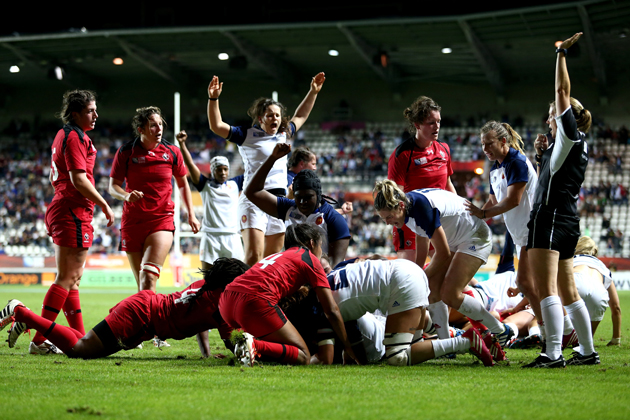The standard of refereeing at this month's Women's World Cup in Paris is proving to be a blight on the tournament
THE POSITIVE aspects of the Women’s World Cup have been overwhelming – stratospheric skill levels across the board, awesome athleticism, refreshingly unexpected results and, on Wednesday, a packed Stade Jean Bouin that delivered a phenomenal atmosphere.
In fact, the two semi-finals played back-to-back made for a wonderful occasion. So often teams are stifled on the big stage, but none of the final four let themselves down.
Canada’s Magali Harvey-inspired defeat of France was enthralling and even Ireland, beaten 40-7 by an invigorated England, brought a huge amount of endeavour. Besides, the significance of a pool-stage win over champions New Zealand cannot be overstated – it catapulted the competition into the consciousness of a wider audience. Philip Doyle’s charges absolutely made their nation proud.

Spreading the word: a big crowd turned out at Stade Jean Bouin to watch the France v Canada semi-final
When the dust settles in Paris on Monday morning, everyone will reflect on a fabulous event. Hopefully there will be a surge in participation and we can look back on a seminal 17 days for the sport. There is one moan, though. Despite its undoubtedly noble intentions, the IRB’s decision to deploy exclusively female on-field officials for the entirety of the tournament has been a mistake.
The past fortnight has highlighted the rocketing standard of women’s rugby. However, it has also underlined a discrepancy between the growing ability of female players and the underwhelming assertiveness of those with the whistle. At the moment, referees are lagging behind. That is a dangerous basis for any contest, let alone a global showpiece.
Take Wednesday’s fixtures in isolation. The breakdown battle between England and Ireland often descended into a chaotic lottery because two excellent back rows – led by supreme scavengers Maggie Alphonsi and Claire Molloy – were given far too long a leash at the ruck.
Later, the scrums during Canada’s clash with France were shambolic. A first-half yellow card for the hosts’ wing Caroline Ladagnous following a fairly tame challenge deemed to be a tip-tackle seemed misguided too, more so because a television replay was requested.
Blaming individuals is not constructive here – the system is hanging them out to dry somewhat. Australian Amy Perrett, who took charge of England’s victory, only made her Test bow in March as Scotland faced Italy in Edinburgh. Although experienced as a player, Irishwoman Helen O’Reilly had only 18 months behind her as an international 15s referee before officiating the second semi-final. Both served apprenticeships on the sevens circuit, but the intensity of a World Cup remains a baptism of fire.
Positive discrimination and political correctness can become damaging when a process is rushed. As a comparison, Kiwi Glen Jackson was earmarked for fast-tracking after finishing an illustrious career in 2010 and becoming a referee. Still, he needed to impress in the Super 15, the Junior World Championship and as a television match official before assuming lead responsibility for Fiji’s trip to Twickenham and Georgia’s game against Japan in November 2012. And he is far from guaranteed to be part of the men’s World Cup in 2015.
It is a frustration that has been felt privately by players and coaches for a while. Then, after his team’s pool-stage loss to New Zealand a week ago, USA boss Pete Steinberg vented a bit. He gave Scrumqueens’ Ali Donnelly, who has written a column on the matter in this month’s Rugby World magazine, some compelling opinions.
“I will be quite honest,” he said. “I think it is unfair on the players. My experience, not just in rugby but in business, is that when men make appointments they tend to make them and say we need ‘women something’.
“When women make appointments, they generally just want the best. I feel if you asked any woman here, they would say they just want the best. There are some excellent referees here, but we do not have the best that are available and that is what the players deserve.”
Steinberg’s meritocratic argument is very convincing. Having developed so well since 2010, women’s rugby has earned the right to see its matches facilitated by practised, polished operators. It’s just a thought, but Nigel Owens is not involved in either of this weekend’s Rugby Championship ties. Why not wing him in? Well, it would undermine those who have officiated in the lead-up.
So we are back to square one. The IRB’s high performance match official manager Joel Jutge is out in France. He will no doubt take stock of events and work out the most practical means of moving forward. Certainly, the best two sides have reached the decider, which is a decent gauge of the fact that nothing too disastrous has happened.
Even so, this is a situation that must be severely scrutinised. The women’s game is coming on so quickly, as every viewer from this eye-opening two weeks will testify. It would be a mighty shame to keep stifling it.
Read a few ideas of what could improve the women’s game in the September issue of Rugby World – on sale now.







